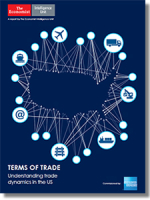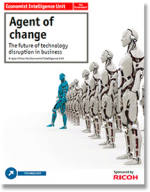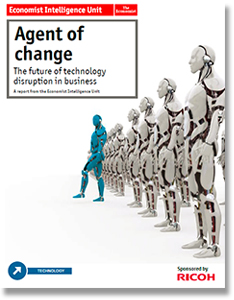Agent of Change: The Future of Technology Disruption in Business
New technologies and processes will only be as effective as the people who use them, and failure to appreciate the cultural obstacles to technology-led change will remain a recipe for falling behind.
Agent of change: The future of technology disruption in business is an Economist Intelligence Unit white paper, sponsored by Ricoh.
It reviews the impact that technology developments will have over the next decade on various aspects of business, including organisational structures, jobs and the workplace, customer interactions, and business models themselves.
The Economist Intelligence Unit bears sole responsibility for the content of this report. The findings do not necessarily reflect those of the sponsor.
The report draws on two main research inputs for its findings:
- A global survey of 567 executives, conducted in September and October 2011 , on their expectations of the impact that technology will have on business between now and 2020. All respondents were at senior management level, with nearly one-half (46%) from the board or C-suite. Respondents hailed from a wide range of industries, with financial services, government and the public sector (including healthcare), education, professional services, technology, and manufacturing especially prominent. Of the firms polled, 43% had annual revenue of US$500m or more.
- A series of in-depth interviews with leading technology and business thinkers, as well as senior executives in different sectors.
To act on the opportunities created by technology, however, business processes and structures will also need to change, and only people will be able to bring this off. In the debate about whether technology-led innovation in business will slow or accelerate, we have come down decidedly in favour of the latter.
But if anything will slow the pace of change, it will more likely be people themselves rather than any limitations of technology. Cultural acceptance is one of technology’s greatest barriers. “Change takes time,” Ms Gratton reminds us. “This is a frustration for the technologically adept, because culture changes more slowly than technology.”
What’s Related




Favorites





